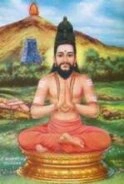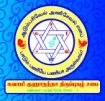

திரு அருணகிரிநாதர் அருளிய
திருப்புகழ்
Sri AruNagirinAthar's
Thiruppugazh

 |  திரு அருணகிரிநாதர் அருளிய Sri AruNagirinAthar's |  |
|---|
| (இந்த வலைத்தளத்தைப் பயன்படுத்துவதற்கு முன்பு எனது முக்கியக் குறிப்பைப் படியுங்கள் - நன்றி). (Please read my important note before using this website - Thank You). |
| திருப்புகழ் 517 திரு நிலம் மருவி (கயிலைமலை) Thiruppugazh 517 thirunilammaruvi (kayilaimalai) |
 |  | தமிழிலும் ஆங்கிலத்திலும் பொருள் எழுதியது ஸ்ரீ கோபால சுந்தரம் Meanings in Tamil and English by Sri Gopala Sundaram | English PDF அமைப்பு in PDF | ஆலய வரிசை அகரவரிசை எண்வரிசை தேடல் venue list alphabetical numerical search |
|
தனதன தனனத் தான தனதன தனனத் தான தனதன தனனத் தான ...... தனதான ......... பாடல் ......... திருநில மருவிக் காலி னிருவழி யடைபட் டோடி சிவவழி யுடனுற் றேக ...... பரமீதே சிவசுட ரதனைப் பாவை மணமென மருவிக் கோல திரிபுர மெரியத் தீயி ...... னகைமேவி இருவினை பொரியக் கோல திருவரு ளுருவத் தேகி யிருள்கதி ரிலிபொற் பூமி ...... தவசூடே இருவரு முருகிக் காய நிலையென மருவித் தேவ ரிளையவ னெனவித் தார ...... மருள்வாயே பரிபுர கழலெட் டாசை செவிடுகள் படமுத் தேவர் பழமறை பணியச் சூல ...... மழுமானும் பரிவொடு சுழலச் சேடன் முடிநெறு நெறெனக் கோவு பரியினை மலர்விட் டாடி ...... அடியார்கள் அரஹர வுருகிச் சேசெ யெனதிரு நடனக் கோல மருள்செயு முமையிற் பாக ...... ரருள்பாலா அலரணி குழல்பொற் பாவை திருமக ளமளிப் போரொ டடியவர் கயிலைக் கான ...... பெருமாளே. ......... சொல் விளக்கம் ......... திரு நிலம் மருவிக் காலின் இரு வழி அடை பட்டு ஓ(ட்)டி ... ஒளி வீசும் ஜோதி இடத்தைப் பொருந்தி, பிராண வாயு செல்லும் இடகலை, பிங்கலை மார்க்கங்கள்* அடைபடும்படி மூச்சை ஓட்டி, சிவ வழி உடன் உற்று ஏக பர(ம்) மீதே ... சிவ நெறியில் நின்று, தனித்து நிற்கும் மேலிடத்தே சிவ சுடர் அதனைப் பாவை மணம் என மருவி ... சிவ ஜோதியை பொம்மைக் கல்யாணம் போலக் கூடி, கோல திரி புரம் எரியத் தீயில் நகை மேவி ... விளங்கி நிற்கும் (காமம், வெகுளி, மயக்கம் என்னும்) மும்மலங்களும் உனது புன்னகையில் விளைந்த தீயில் எரிபட்டு அழிய, இரு வினை பொரியக் கோல திருவருள் உருவத்து ஏகி ... எனது நல் வினை, தீ வினை ஆகிய இரண்டு வினைகளும் பொரிந்து சாம்பலாக, அழகிய உனது திருவருளாகிய உருவத்தில் ஈடுபட்டு, இருள் கதிர் இலி பொன் பூமி தவசு ஊடே ... இருளும் ஒளியும் இல்லாத அழகிய பூமியிடத்தே, தவ நெறிப் பயனாய் இருவரும் உருகிக் காய(ம்) நிலை என மருவி ... நீயும் நானும் ஒன்றுபடக் கலந்து, (அத்தகையக் கலப்பால்) இவ்வுடல் நிலைபட்டதெனப் பொருந்தி, தேவர் இளையவன் என வித்தாரம் அருள்வாயே ... தேவர்கள் இவன் இளையவன் என்று என்னை வியந்து கூறும்படியான விசித்திரப் பெரும் பேற்றை அருள்வாயாக. பரிபுர கழல் எட்டு ஆசை செவிடுகள் பட ... சிலம்பு, வீரக் கழல்கள் ஆகியவற்றின் ஒலிகள் எட்டு திசைகளிளும் செவிடுபடும்படியாக ஒலிக்க, முத்தேவர் பழ மறை பணிய ... பிரமன், ருத்திரன், திருமால் என்னும் முத்தேவர்களும், பழமையான வேதங்களும் பணிந்து போற்ற, சூலம் மழு மானும் பரிவோடு சுழல ... (கைகளில் ஏந்திய) சூலம், மழு, மான் ஆகிய மூன்றும் பக்குவமாகச் சுழல, சேடன் முடி நெறு நெறு என ... நாகராஜனாகிய ஆதிசேஷனின் பணாமுடிகள் நெறு நெறு என்று முறிய, கோவு பரியினை மலர் விட்டு ஆடி ... நந்தியாகிய வாகனத்தில் திருவடி மலரை வைத்திருத்தலை விட்டு, நடனம் செய்து, அடியார்கள் அரஹர உருகிச் சே செ என ... அடியார்கள் அரகர என மனம் உருகி ஜெய ஜெய என்று போற்ற, திரு நடனக் கோலம் அருள் செ(ய்)யும் உமையின் பாகர் அருள் பாலா ... ஆனந்த நடனக் காட்சியைத் தந்தருளும் பார்வதியின் பாகராகிய சிவ பெருமான் ஈன்றருளிய குழந்தையே, அலர் அணி குழல் பொன் பாவை திரு மகள் அமளிப் போரொடு ... மலர் அணிந்த கூந்தலை உடைய அழகிய பாவையும், லக்ஷ்மியின் மகளுமான வள்ளியின் மஞ்சத்திலே இன்பப் போரிடுதலை விரும்புவதோடு, அடியவர் கயிலைக்கு ஆன பெருமாளே. ... அடியார்கள் வாழும் கயிலை மலையிடத்தும் விருப்பம் காட்டும் பெருமாளே. |
* இங்கு சிவயோக முறைகள் விளக்கப்பட்டுள்ளன. அதன் சுருக்கம் வருமாறு: நாம் உள்ளுக்கு இழுக்கும் காற்றுக்குப் 'பூரகம்' என்றும், வெளிவிடும் காற்றுக்கு 'ரேசகம்' என்றும் பெயர். உள்ளே நிறுத்திவைக்கப்படும் காற்றுக்கு 'கும்பகம்' என்று பெயர். உட் கொள்ளும் பிராணவாயு உடலில் குறிப்பிட்ட 'ஆதாரங்கள்' (நிலைகள், சக்கரங்கள்) மூலமாகப் படிப்படியாகப் பரவி, மேல் நோக்கிச் சென்று, தலையில் 'பிரம கபால'த்தில் உள்ள 'ஸஹஸ்ராரம்' (பிந்து சக்கரம்) என்ற சக்கரத்துக்குச் செல்லும். இந்த ஐக்கியம் ஏற்படும்போது, அமுத சக்தி பிறந்து, ஆறு ஆதாரங்களுக்கும் ஊட்டப்பட்டு, மீண்டும் அதே வழியில் 'மூலாதார'த்தை வந்து அடையும். இந்த ஆதாரங்களை ஒழுங்கு படுத்தும் வகையில் மூன்று 'மண்டல'ங்களும் (அக்கினி, ஆதித்த, சந்திர மண்டலங்கள்), பத்து 'நாடி'களும் (இடைகலை, பிங்கலை, சுழுமுனை முதலியன) உள்ளன. 'இடைகலை' பத்து நாடிகளுள் ஒன்று. இடது நாசியால் விடும் சுவாசம். 'பிங்கலை' பத்து நாடிகளுள் ஒன்று. வலது நாசி வழியால் விடும் சுவாசம். 'சுழு முனை' இடைகலைக்கும் பிங்கலைக்கும் இடையில் உள்ளது. 'சுழு முனை' ஆதாரம் ஆறிலும் ஊடுருவி நிற்பது. 'இடைகலை'யும், 'பிங்கலை'யும் ஒன்றுக்கொன்று பின்னி நிற்பன. சுவாச நடப்பை 'ப்ராணாயாமம்' என்ற யோக வன்மையால் கட்டுப்படுத்தினால் மன அமைதி ஏற்படும். |
| 'wikisource' reference links for this song இப்பாடலுக்கான 'விக்கிமூலம்' இணையப் பக்கங்கள் pg 1.569 pg 1.570 pg 1.571 pg 1.572 WIKI_urai Song number: 238 goto wiki alpha list (Please note: Kaumaram.com is NOT responsible for accuracy and contents of external links) |
| ஸ்ரீ மஹா பெரியவா திருப்புகழ் சபை & சுவாமி குஹாநந்தா திருப்புகழ் சபை (சேலம்) Sri Maha Periyava Thirupugazh Sabha & Swamy Gughanandha Thirupugazh Sabha (Salem) |
 |  |  |
 | இப்பாடலின் பொருள் meanings in Tamil |  |
(Please note: Kaumaram.com is NOT responsible for accuracy and contents of external links) top |
|
Song 517 - thiru nilam maruvi (kayilaimalai) thirunila maruvik kAli niruvazhi yadaipat tOti sivavazhi yudanut REka ...... parameethE sivasuda rathanaip pAvai maNamena maruvik kOla thiripura meriyath theeyi ...... nakaimEvi iruvinai poriyak kOla thiruvaru Luruvath thEki yiruLkathi rilipoR pUmi ...... thavacUdE iruvaru murukik kAya nilaiyena maruvith thEvar iLaiyava nenavith thAra ...... maruLvAyE paripura kazhalet tAsai sevidukaL padamuth thEvar pazhamaRai paNiyac cUla ...... mazhumAnum parivodu cuzhalac cEdan mudineRu neRenak kOvu pariyinai malarvit tAdi ...... adiyArkaL arahara vurukic cEce yenathiru nadanak kOlam aruLseyu mumaiyiR pAka ...... raruLbAlA alaraNi kuzhalpoR pAvai thirumaka LamaLip pOro dadiyavar kayilaik kAna ...... perumALE. ......... Meaning ......... thiru nilam maruvik kAlin iru vazhi adai pattu O(t)ti: Concentrating on the illuminated zone, guiding the inhaled breath along the route of the pranic air -oxygen- (namely, through idakala and pingala closing them)*, siva vazhi udan utRu Eka para(m) meethE: holding steadily on to the path of SivA and then rising high to the unique zenith siva sudar athanaip pAvai maNam ena maruvi: for merging with the flame of SivA like in the wedlock of two puppets, kOla thiri puram eriyath theeyil nakai mEvi: burning down the three prominent slags (namely, desire, anger and delusion) in the fire caused by Your mere smile, iru vinai poriyak kOla thiruvaruL uruvaththu Eki: also my deeds (both good and bad) being charred to ashes, I wish to focus on Your beautiful and gracious form; iruL kathir ili pon pUmi thavasu UdE: in this wonderful earth where there is neither darkness nor light, as a result of my penance in my previous births, iruvarum urukik kAya(m) nilai ena maruvi: I wish for the union between You and I to happen; because of that union, this body is to be deemed indestructible thEvar iLaiyavan ena viththAram aruLvAyE: to the envy of even the celestials who must wonder who this youth is; kindly bless me with that strange and singular honour! paripura kazhal ettu Asai sevidukaL pada: The sounds from His anklets of triumph making deafening noise in all the eight directions; muththEvar pazha maRai paNiya: the Trinity (BrahmA, VishNu and Rudran) and the ancient VEdAs paid obeisance to Him; cUlam mazhu mAnum parivOdu suzhala: the trident, the pick-axe and the deer in His hands revolved nimbly; sEdan mudi neRu neRu ena: the Serpent-King AdhisEshan's hoods cracked with a loud noise; kOvu pariyinai malar vittu Adi: as He stepped aside by moving His lotus-like feet from His vehicle, Bull (namely, Nandi) and began to dance; adiyArkaL arahara urukic cE ce ena: His devotees extolled Him with a melting heart saying "Hara Hara, Jaya Jaya"; thiru nadanak kOlam aruL se(y)yum umaiyin pAkar aruL pAlA: such a great cosmic dance was graciously presented by Lord SivA, the consort of PArvathi; and You are His son, Oh Lord! alar aNi kuzhal pon pAvai thiru makaL amaLip pOrodu: You relish the blissful duel on the bed with beautiful VaLLi, whose hair is adorned with flowers and who is the daughter of Goddess Lakshmi; adiyavar kayilaikku Ana perumALE.: You are also equally fond of Mount KailAsh where Your devotees live, Oh Great One! |
* In this song, several Siva-yOgA principles are explained: The inhaled air is known as 'pUragam' and the exhaled air is 'rechagam'. The retained air is 'kumbagam'. The oxygen that enters the body climbs up step by step through several centres, known as 'chakrAs' and ultimately reaches 'sahasrAram' or 'bindhuchakram' on the top of the skull. At that point of union, nectar flows from that chakrA and seeps through and soaks the six centres of the body and returns to the basic chakrA, 'mUlAthAram'. Three zones (namely, the sun zone, the moon zone and the fire zone) and ten nerves ('nAdis') govern the six centres; the principal nerves are 'susumna', 'idaikala' and 'pingala'. idakala: one of the ten 'nAdis' (nerves), when inhalation takes place through the left nostril; pingala: one of the ten 'nAdis' (nerves), when inhalation takes place through the right nostril; susumna: one of the ten 'nAdis' (nerves), situated between the above two 'nadis', and running through the spinal chord covering all the six centres of 'kundalini'. ('idakala' and 'pingala' are entwined around 'susumna'). If breathing is controlled through a yOgA called 'praNAyAmA', the mind becomes tranquil. |
| தமிழில் PDF அமைப்பு ஆலய வரிசை அகரவரிசை எண்வரிசை |
| ... https://kaumaram.com ... The website for Lord Murugan and His Devotees முகப்பு அட்டவணை மேலே home contents top |
Kaumaram.com is a non-commercial website. This website is a dedication of Love for Lord Murugan. PLEASE do not ask me for songs about other deities or for BOOKS - This is NOT a bookshop - sorry. Please take note that Kaumaram.com DOES NOT solicit any funding, DIRECTLY or INDIRECTLY. © Copyright Kaumaram dot com - 2001-2040 COMMERCIAL USE OF MATERIAL IN THIS WEBSITE IS NOT PERMITTED. Please contact me (the webmaster), if you wish to place a link in your website. email: kaumaram@gmail.com Disclaimer: Although necessary efforts have been taken by me (the webmaster), to keep the items in https://kaumaram.com safe from viruses etc., I am NOT responsible for any damage caused by use of and/or downloading of any item from this website or from linked external sites. Please use updated ANTI-VIRUS program to rescan all downloaded items from the internet for maximum safety and security. மேலே top |